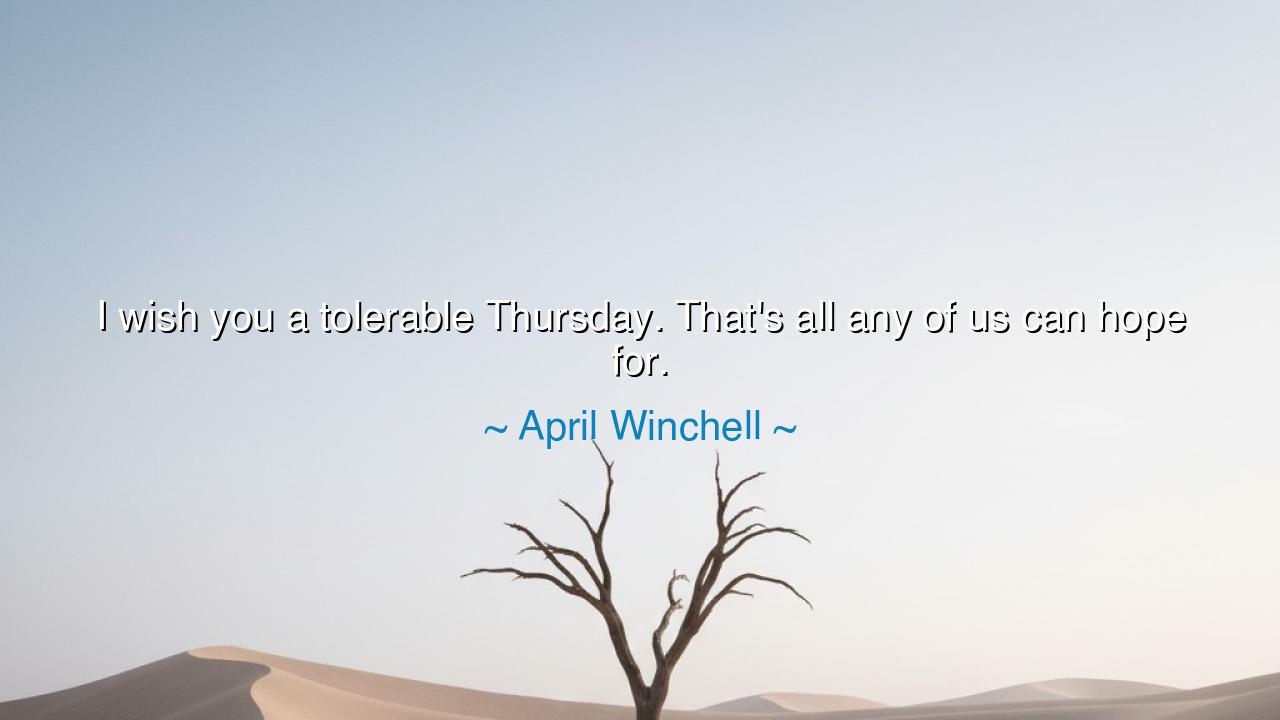
I wish you a tolerable Thursday. That's all any of us can hope






"I wish you a tolerable Thursday. That's all any of us can hope for." – April Winchell
In this wry and tender remark, April Winchell captures a truth that is both humorous and profound — that much of life is not lived in triumph or tragedy, but in the quiet middle ground between them. To wish someone a “tolerable Thursday” may sound small, even ordinary, but beneath those words lies an ancient wisdom: that peace is not always found in greatness, but in acceptance. It is the recognition that perfection is fleeting, and that in the weary rhythm of daily living, sometimes endurance itself is victory.
The origin of this quote comes from Winchell’s sharp wit and her gift for finding truth in the mundane. As a voice actress, writer, and humorist, she has long observed the absurdity of human striving — our endless chase for happiness, success, or meaning — while forgetting the beauty in the simple act of getting through the day. In saying “that’s all any of us can hope for,” she is not preaching despair, but humility. She reminds us that life’s worth is not measured in the grandeur of moments, but in the grace with which we survive the ordinary.
This wisdom echoes that of the ancient Stoics, who taught that tranquility, not ecstasy, was the goal of the wise. Epictetus, once a slave, said that happiness lies not in changing the world, but in learning to bear it with courage and calm. Winchell’s words are a modern echo of that same teaching: to endure the day with humor, to find comfort in adequacy, and to accept that sometimes life’s blessing is not joy, but tolerability — the fragile peace between storms.
Consider, for example, the story of Viktor Frankl, the psychiatrist who survived the Nazi concentration camps. Amid unimaginable suffering, he wrote that the last of human freedoms is to choose one’s attitude — to find meaning even in suffering. Frankl did not speak of happiness, for that would have been absurd in his circumstance; he spoke of endurance, of the will to persist through one more day. Like Winchell’s Thursday, it was not glorious — but it was enough. And in that “enough,” humanity endured.
Winchell’s humor hides a deeper compassion: she speaks for all who labor through the long, gray stretches of life — the tired mother, the worker, the student, the lonely soul. Her words offer permission to be human, to let go of the impossible demand to always shine. There is beauty, she suggests, even in mediocrity; dignity, even in weariness. To have a “tolerable Thursday” is to survive the day’s demands without losing oneself — and that, she implies, is no small achievement.
There is also quiet rebellion in her simplicity. In a world that glorifies relentless positivity and constant success, to say “tolerable” is to reject illusion. It is to embrace the honest, unvarnished texture of life — to laugh at our fatigue and find warmth in our shared imperfection. Humor, in this sense, becomes both shield and sanctuary: a way to turn weariness into wisdom. By laughing at life’s monotony, we rise above it; by acknowledging struggle, we disarm it.
Lesson: My children, do not chase unending joy, nor despair when life feels ordinary. Each day need not be magnificent to be meaningful. If the sun rises and you rise with it; if you eat, breathe, work, and end the day with a quiet heart — that is enough. Learn to bless the tolerable, to give thanks for the small mercies that carry you forward. For life is not built of grand victories alone, but of a thousand humble survivals. And sometimes, as April Winchell so wisely reminds us, the truest hope we can offer — to ourselves and to others — is simply this: may the day be tolerable, and may we endure it with grace.






AAdministratorAdministrator
Welcome, honored guests. Please leave a comment, we will respond soon